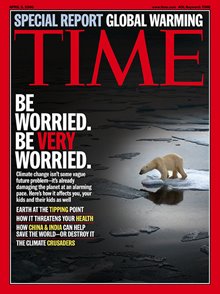 This should have been the cover of Time Magazine fifteen years ago. We knew about the problem then. We knew about it even earlier. But finally the alarm is being sounded. This is also on the front page of the CNN website today. Here's a little bit of what it says:
This should have been the cover of Time Magazine fifteen years ago. We knew about the problem then. We knew about it even earlier. But finally the alarm is being sounded. This is also on the front page of the CNN website today. Here's a little bit of what it says:No one can say exactly what it looks like when a planet takes ill, but it probably looks a lot like Earth.
Never mind what you've heard about global warming as a slow-motion emergency that would take decades to play out. Suddenly and unexpectedly, the crisis is upon us.
From heat waves to storms to floods to fires to massive glacial melts, the global climate seems to be crashing around us.
The problem -- as scientists suspected but few others appreciated -- is that global climate systems are booby-trapped with tipping points and feedback loops, thresholds past which the slow creep of environmental decay gives way to sudden and self-perpetuating collapse. That's just what's happening now.
It's at the north and south poles -- where ice cover is crumbling to slush -- that the crisis is being felt the most acutely.
Late last year, for example, researchers analyzed data from Canadian and European satellites and found that the Greenland ice sheet is not only melting, but doing so faster and faster, with 53 cubic miles draining away into the sea last year alone, compared to 23 cubic miles in 1996.One of the reasons the loss of the planet's ice cover is accelerating is that as the poles' bright white surface disappears it changes the relationship of the Earth and the sun. Polar ice is so reflective that 90 percent of the sunlight that strikes it simply bounces back into space, taking its energy with it. Ocean water does just the opposite, absorbing 90 percent of the light and heat it receives, meaning that each mile of ice that melts vanishes faster than the mile that preceded it.
This is what scientists call a feedback loop, and a similar one is also melting the frozen land called permafrost, much of which has been frozen -- since the end of last ice age in fact, or at least 8,000 years ago.
Sealed inside that cryonic time capsule are layers of decaying organic matter, thick with carbon, which itself can transform into CO2. In places like the southern boundary of Alaska the soil is now melting and softening.
As fast as global warming is changing the oceans and ice caps, it's having an even more immediate effect on land. Droughts are increasingly common as higher temperatures also bake moisture out of soil faster, causing dry regions that live at the margins to tip into full-blown crisis.
Wildfires in such sensitive regions as Indonesia, the western U.S. and even inland Alaska have been occurring with increased frequency as timberlands grow more parched. Those forests that don't succumb to fire can simply die from thirst.
I want to take issue with something in the second paragraph above. The writer says, "Suddenly and unexpectedly, the crisis is upon us." It was not unexpected. It was not unexpected. Scientists have been warning us for decades.
But of course, here in Oklahoma we have people like Senator Inhofe who continue to insist that global warming is a myth. It tempts me to despair; it really does.
Ellie, we will not witness it of course, but natural selection will eliminate "intelligence". Our "intelligently designed" decisions are meaningless in the eons of time ahead. A "rapture" may occur for those folks, but their kingdom will NOT be on this earth .... cockroaches and flies will bring forth the next generations, and the god of the evolution of grand experiments like the dinosaurs, will sigh and say, "Well that was interesting."
ReplyDelete